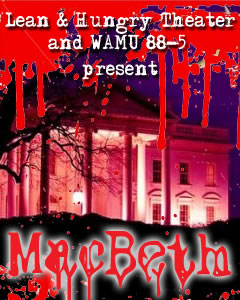Macbeth
An Inside-the-Beltway Perspective
For the Scottish Tragedy
Lean & Hungry Theater, WAMU 88.5 FM Radio, Washington, D.C.
Saturday, October 30, 2010
Directed by Karen Munson and Kevin Finkelstein
 The premise: Macbeth is a public official, the Thane of Glamis, in Washington, D.C., who happened to be visiting Afghanistan when he helped foil an insurgent attack by “unseam[ing]” the terrorist “from the nave to th’chops” (so said a witness in a news broadcast directly quoting the captain’s lines in Shakespeare’s play). Thanes must be the equivalent of cabinet members in King Duncan’s administration, and after the Thane of Cawdor was brought home in disgrace and stripped of his title following failed trade talks with Norway, Macbeth became Thane of Cawdor, too. Because the Weird Sisters had already hailed him as Thane of Cawdor along with Thane of Glamis in a phone call, Macbeth took to heart their hailing him as “king hereafter” and, with his socialite wife, set out to assassinate Duncan.
The premise: Macbeth is a public official, the Thane of Glamis, in Washington, D.C., who happened to be visiting Afghanistan when he helped foil an insurgent attack by “unseam[ing]” the terrorist “from the nave to th’chops” (so said a witness in a news broadcast directly quoting the captain’s lines in Shakespeare’s play). Thanes must be the equivalent of cabinet members in King Duncan’s administration, and after the Thane of Cawdor was brought home in disgrace and stripped of his title following failed trade talks with Norway, Macbeth became Thane of Cawdor, too. Because the Weird Sisters had already hailed him as Thane of Cawdor along with Thane of Glamis in a phone call, Macbeth took to heart their hailing him as “king hereafter” and, with his socialite wife, set out to assassinate Duncan.
The modus operandi of Lean & Hungry Theater’s radio play adaptations of Shakespeare is for the characters in the story to speak the original lines while an un-Shakespearean narrative framework retools the play’s setting. So, aside from Macbeth working in a bureaucrat’s office somewhere in the nation’s capital and newscasts filling in the plotlines, you have such gimmicks as a traffic report giving details on Beltway traffic jams wrought by Duncan’s motorcade from the White House to Macbeth’s castle, a nice suburban home in Northern Virginia; Macduff not only knocking on Macbeth’s door but also using incessant doorbell ringing to wake the porter; the FBI naming Duncan’s fled sons as persons of interest in the king’s murder; and King Macbeth’s poll numbers sinking to record lows even as Queen Macbeth establishes a new fashion trend in DC society circles by wearing white gloves.
The biggest gimmick was the Weird Sisters literally phoning in their performances (albeit the actual performances of Rebecca A. Herron, Julie Garner, and Jessica Hansen were chillingly good). At the end of their initial meeting with Macbeth and Banquo via speakerphone, the witches hung up leaving only static on the line. “Whither have they vanished?” said Banquo. “Into the air,” replied Macbeth. Cute. When Macbeth consulted them again later in the play, the Second Witch dialed the phone as she said “By the pricking of my thumbs, something wicked this way comes.” Cute, too.
Such a narrative framework Lean & Hungry works to near perfection in its Midsummer Night’s Dream. However, in this production the mashup of Shakespeare’s play with DC insider politics and modern technology is too cute at best, disjointed at worst. The retooling went so far that it might have been better to completely overhaul the play a la Joe Macbeth or Throne of Blood. Indeed, it’s the Shakespeare that seemed out of place in this adaptation.
I have come to consider Macbeth to be Shakespeare’s most difficult male role, as I’ve never been wholly satisfied with any I’ve seen. For a man of action, he is awfully ambivalent. Turn the Highland thane of yore into an official in the Duncan White House and Alex Zavistovich’s challenge with the role increased multifold. Let’s face it, political bureaucrats seldom hold our interest, including one who contemplates murder with the measured thoughts of a C-Span speech and reacts to the threats of Banquo and Macduff with all the angst of an irritated commuter contending with stupid drivers (admittedly, in DC that's a lot of angst). He did display genuine affection for his wife, even after he holed himself up in “Dunsinane at Camp David,” a necessary precedent to attaining the depths of despair Macbeth mines in his “Tomorrow, and tomorrow, and tomorrow” speech.
Along with playing a witch, Jessica Hansen played the title, um, lady. But her Lady Macbeth was hardly more than a, um, ladylike Real Housewife of DC, a syrupy sweetness being her means of manipulation. Surely, sweet demeanors have masked many a Lady Macbeth, on stage and in real life. However, on the radio, while I heard plenty of affection for her husband, I sensed none of the ambitious urging or righteous posturing that would be enough to convince an uncertain Macbeth to undertake so drastic a deed as murdering his king, mentor, and benefactor while a guest in his home (all reasons Macbeth gave for not doing the murder; his only reason for doing the murder was that a threesome of phone vixens hailed him as king hereafter).
Hansen did bring a couple of interesting interpretations to her role, though. When Macbeth wondered before committing the assassination, “What if we fail,” Hansen laughed and emphasized the question mark in her response of “We fail?” as if failure was inconceivable to a couple who had always screwed their courage to the sticking-place and succeeded. That may be a more apt reading as a DC parable than a Lady Macbeth who grants that failure is possible and therefore more reason to proceed with stout courage. Hansen’s Lady Macbeth also sounded genuinely surprised and concerned when her husband suddenly hinted at how he planned to turn on their old friend Banquo. This, again, was a suitable DC parable, where social and career climbers genuinely believe they stop climbing once they’ve reached the top rung (and the counter parable that they believe the top rung still has the support of all the rungs they’ve stepped on below).
Among Shakespeare’s plays, Macbeth is one of his most visual. Vision (and visions) is, in fact, one of the play’s archetypal images, and along with staged apparitions, the play features a riveting scene of Banquo’s ghost who says nothing. How to portray a silent ghost on the radio without using a narrator intruding on Shakespeare’s depiction of this pivotal shift in Macbeth’s mental state? Steve Beall’s Banquo shouted “O treachery!” at the moment of his murder, and we heard him distantly repeat the phrase when Macbeth saw his ghost at the banquet as well as when Banquo appeared as the witches’ final apparition.
This moment illustrated how adapting Shakespeare as a radio play can create a truly Shakespearean effect and thrilling story. Throwing in traffic reports, news flashes, doorbells, dial tones, and thumbs pricked by a keypad are all interesting in their way; but regarding Shakespeare, it makes for a tale full of sound and fury without much significance.
Eric Minton
November 20, 2011
Comment: e-mail editorial@shakespeareances.com
Start a discussion in the Bardroom


